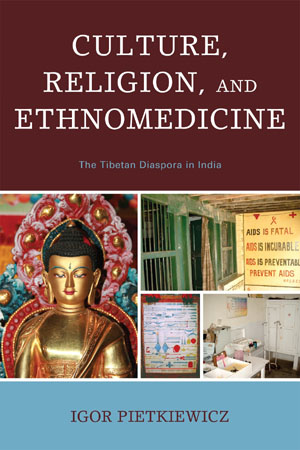CULTURE, RELIGION, ETHNOMEDICINE

>> John Paul II Hospital & Research <<
The > Jagiellonian University < (Polish: Uniwersytet Jagielloński, often shortened to UJ; historical names: Latin: Studium Generale, Kraków Academy, The Main Crown School, Main School of Kraków, Kraków University) was established in 1364 by Casimir III the Great in Kraków. It is the oldest institution of higher education in Poland, the second oldest university in Central Europe and one of the oldest universities in Europe.
Culture, Religion, and Ethnomedicine discusses various interdependencies between culture, religion, and health with a concentration on Tibetan culture. Igor Pietkiewicz uses an example of the Tibetans in exile to explain how culture affects illness behavior, including perception of sickness and treatment methods, as well as the choice of an appropriate cure. The book also touches upon the problem of migration and various risk factors associated with adjustment of ethnic minorities in a host country. It elaborates on the issues not limited to a single refugee community, but universal in a world that is becoming a global village. Students planning to do qualitative research in social sciences will find this book valuable. Students can learn how to select data and get information about data sources, analysis, and management from the chapter on qualitative research methodology. This book will also be helpful to health practitioners who treat individuals representing other cultures as well those interested in health issues in multi-cultural settings.
Igor Pietkiewicz, Ph.D., is a Polish psychotherapist and researcher at John Paul II Hospital in Krakow. He is lecturer at Jagiellonian University where he has designed and taught university courses on medical anthropology and thanatology. He cooperates with the Division of the Psychology of Religion and School of Medicine in English (Jagiellonian University). Founder and president of the Polish Medical Anthropology Association.
CONTENTS:
Chapter 1: Tibetan Culture, Religion, and Acculturation
Levels and Dimensions of Culture. Religion as an Important Component of Culture. Culture in Transition. Typologies of Migration. Refugees as a Distinct Category of Migrants. Acculturation. Factors Affecting Acculturation.
Chapter 2: Health and Illness Behaviors
From Biomedicine to Holism. Biomedical Model. Humanistic Model. Holistic Model. Interdependence between Culture and Health. Culture as a Salutary Agent. Healthy Behaviors. Culture and Identity. Culture as a Means of Social Support. Culture as a Pathogenic Agent. Unhealthy Lifestyles. Acculturative Stress. Identity Confusion. Culture as a Pathoplastic Agent. Culture as a Meaning-Making Device. Idiom of Health and Ill-Health. Folk Categories and Explanatory Models. Illness Behavior. Help-Seeking Behavior. Help-Seeking Pathways.
Chapter 3: Religion and Health
Interdependence between Religion and Health. Religion and Mental Health. Overview of the Research Findings. Religion as a Salutary Agent. Mechanisms for Religion‘s Effects on Health. Religion as a Source of Coping Strategies. Religious Coping in Empirical Studies. Predictors of Religious Coping. Pathogenic and Pathoplastic Functions of Religion.
Chapter 4: Tibetan Buddhism in Tibet and in Exile
History of Tibetan Buddhism. Hinayana, Mahayana, Vajrayana: Three Paths of Dharma. History of Buddhism in Tibet. The Cultural Revolution. Key Teachings of Dharma. The Truth of Suffering. The Truth of the Causes of Suffering. The Truth of the Cessation of Suffering. The Truth of the Path. Coping with Suffering. Taking Refuge. Calm-Abiding Meditation. Tong len. Purification and Two Accumulations. Dharma in Everyday Life. Religious Institutions in Exile.
Chapter 5: The Traditional Tibetan System of Medicine in Tibet and in Exile
Health-Related Problems among the Tibetan Diaspora. Professional Healthcare in Tibet and in Exile. History of the Traditional Tibetan System of Medicine. Fundamental Concepts of Tibetan Medicine. Diagnosis in Tibetan Medicine. Treatment in Tibetan Medicine. Tibetan Medicine and Demonology. Tibetan Medicine and Astrology.
Chapter 6: Empirical Research
The Sample. The Research Context. Methodology and Method. Qualitative Methods. Grounded Theory. Methods of Data Collection. Qualitative Data Analysis. Coding Qualitative Data. Procedures for Data Collection. Planning the Research Process.
Chapter 7: Presenting and Analyzing the Qualitative Data
Support and Treatment Methods. The Traditional Tibetan System of Medicine. Paramedical Solutions. Western Allopathic Medicine. Factors Affecting Illness Behavior. Age Factor. Severity of Symptoms and Duration of Treatment. Economic Effects Factor. Treatment Availability Factor. Idiom of Disease. Views on Treatment Methods. Three Levels of Acculturation. Educational Background. Grounded Theory of Illness Behavior.
Chapter 8: Discussion and Conclusions
The Idiom of Disease in the Tibetan Community. Perception and Assessment of Treatment Methods. Common Help-Seeking Pathways. Variables Affecting Illness and Help-Seeking Behavior. Religion and Illness Behavior. Conclusions.
Comments are closed.